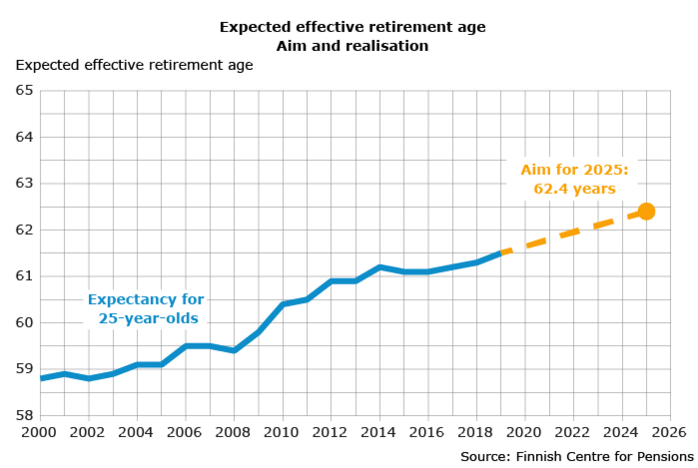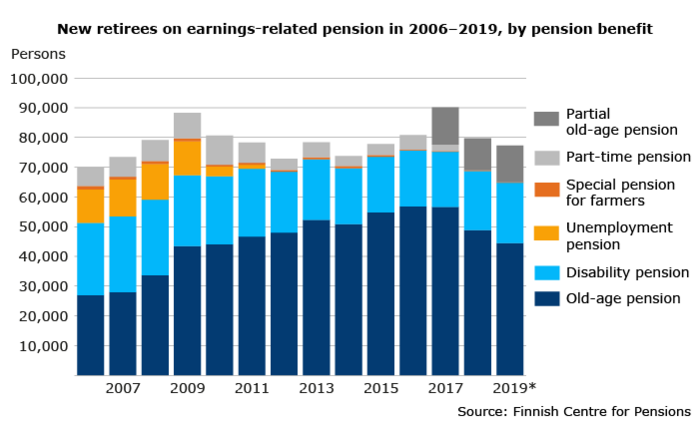Effective retirement age risen clearly

According to the statistics of the Finnish Centre for Pensions, people in Finland retired on an old-age pension at age 61.5 years on average in 2019. This is about one month later than in 2018. A total of 44,500 persons retired on an old-age pension. This is 10 per cent less than in 2018.
Last year, most of those born in 1956 reached their retirement age, which is three months higher (63 years and 3 months) than that of those born a year earlier.
The increase of the retirement age agreed on in the 2017 pension reform has raised the average effective retirement age and reduced the number of new retirees on an old-age pension.
In 2019, the average retirement age was 61.5 years, which was 0.2 years higher than in 2018. In practice, that means an increase of an ample two months. At the same time, working lives have also been extended.
The average effective retirement age has risen by 2.7 years since the beginning of the century. The goal is for the average effective retirement age to be 62.4 years in 2025 at the latest. To reach that goal, the effective retirement age would have to rise by an ample 10 per cent each year.
“At the moment it would seem that we can reach the target set for the increase of the effective retirement age since people retire on an old-age pension at increasingly higher ages. What is worrisome is the increase in the number of new disability pension recipients,” says development manager Jari Kannisto (Finnish Centre for Pensions).
In 2019, the expected effective retirement age for 25-year-olds was 61.5 years and for 50-year-olds 63.3 years. The expected effective retirement age depicts the average retirement age if the retirement and mortality rates remain on the level of the statistical year.
Slightly more new retirees on a disability pension
In 2019, approximately 65,000 persons retired on an earnings-related pension. Of them, 44,500 persons (71%) retired on an old-age pension. This was 4.400 persons (9%) less than in 2018.
The number of new retirees on a disability pension grew slightly in 2019 compared to 2018. Roughly 20,300 persons retired on a disability pension in 2019, which was 400 persons more than in 2018.
“Unfortunately it seems that retirement on a disability pension has become more common among young women,” Kannisto explains.
More information
Jari Kannisto, Development Manager, phone +358 29 411 2232, jari.kannisto(at)etk.fi
Additional material
Effective retirement age in 2019 (SlideShare)
More statistics on the subject on the website Etk.fi:
Three facts about retirement on an earnings-related pension in 2019:
- The expected effective retirement age was 61.5 years.
- Roughly 65,000 persons retired on an earnings-related pension,
- Approximately 1.4 million individuals receive an earnings-related pension based on their own working life.
NB! People who have taken out a partial old-age pension are not included in the figure of new retirees.
The expected effective retirement age
- depicts the average retirement age if the retirement contingencies and the mortality rates remain on the level of the review year,
- is independent of the demographic age structure and calculated following the same principle as when calculating the expected life expectancy that measures the life span, and
- measures the development of the effective retirement age on an earnings-related pension of the 25- and 50-year-olds.
Rising retirement age
In line with the 2017 pension reform, the retirement age will rise by three months per year until 2027, when the qualifying age for an old-age pension will be 65 years. After that, the retirement age will be linked to the average expected life expectancy.

Reaching the goal requires that the effective retirement age rises steadily by 0.15 years per year.
The effective retirement age has risen particularly because the unemployment pension has been abolished and the number of disability pension retirees has gone down. In the future, the rising retirement age will also raise the effective retirement age.
